Maverick Citizen: NEWSFLASH
After decades of hard work and vaccine initiatives, the wild poliovirus eradicated from Africa
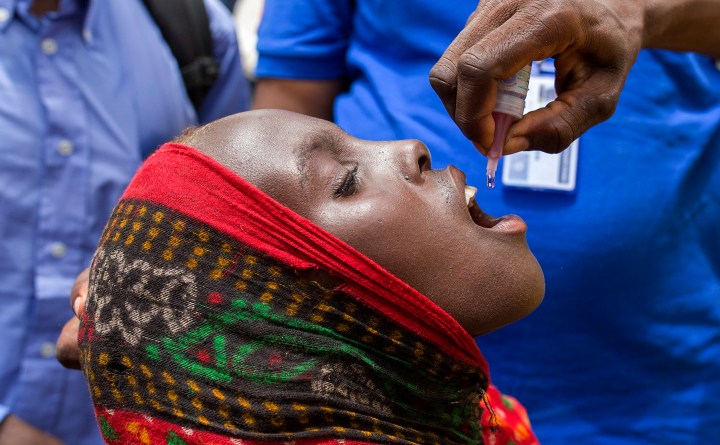
The independent Africa Regional Certification Commission for Polio Eradication officially declared on Tuesday that the World Health Organisation African Region is free of wild poliovirus. This marks the eradication of the second virus from the continent since the smallpox virus 40 years ago.

A (WHO) World Health Organisation mobile health team provides health care to a nomadic settlement in Konduga, Borno state, Nigeria, 2020. (Photo: © Andrew Esiebo/WHO)
Polio is a crippling and potentially fatal infectious disease. Although no cure currently exists, there are safe and effective vaccines which, when given multiple times, can protect a child for life.
Eradicating polio requires immunising every child until transmission stops and the world is free of all forms of poliovirus.
After a 26-year campaign against a disease that once paralysed 75,000 children on the African continent every year, the Africa Regional Certification Commission (ARCC) for polio eradication declared the World Health Organisation (WHO) African Region to be completely free of the wild poliovirus on Tuesday, 25 August.
The eradication certification event hosted by the WHO and ARCC was due to starts at 17:30 CAT (15:30 GMT) and will include a star line-up of speakers including the President of Nigeria, Bill Gates (on behalf of the Bill & Melinda Gates Foundation), Aliko Dangote, and Kenyan senator Harold K Kipchumba, a polio survivor.
Watch the event live on YouTube or Facebook.
Prof Rose Gana Fomban Leke, chairperson of the ARCC, says this marks the second eradication from the surface of the continent since smallpox was wiped out 40 years ago.
“Today is truly a historic day for Africa. The ARCC is pleased to announce that the Region has successfully met the certification criteria for wild polio eradication, with no cases of the wild poliovirus reported in the Region for four years,” says Leke.

A child receives a drop of oral polio vaccine in the south-eastern village of Kakoukro, in Adiaké District. A three-and-a-half-year-old girl, Aicha Traoré, tested positive for polio in this village in December 2008, the first documented polio case in the country in four years. 2009, Mali. (Photo: © UNICEF)
Dr Matshidiso Moeti, WHO regional director for Africa, says the journey towards this momentous achievement started 24 years ago in 1996, when African heads of state endorsed the Yaounde Declaration, thereby committing to the eradication of polio from Africa.
Moeti adds that the real game changer came when former president Nelson Mandela and Rotary International launched the “Kick Polio Out of Africa” campaign in 1996. The campaign certainly succeeded in mobilising partners, donors, member states, and communities around this noble cause.
Since then, governments, partners, and communities have strengthened surveillance systems and supported extensive vaccination campaigns, preventing 1.8 million cases of polio-related paralysis.
The last case of paralysis by wild poliovirus was reported four years ago in Nigeria.
“We know from surveillance, and we also know from modelling that’s been carried out, that the circulation of wild poliovirus in the region was likely terminated in 2018,” says Moeti.
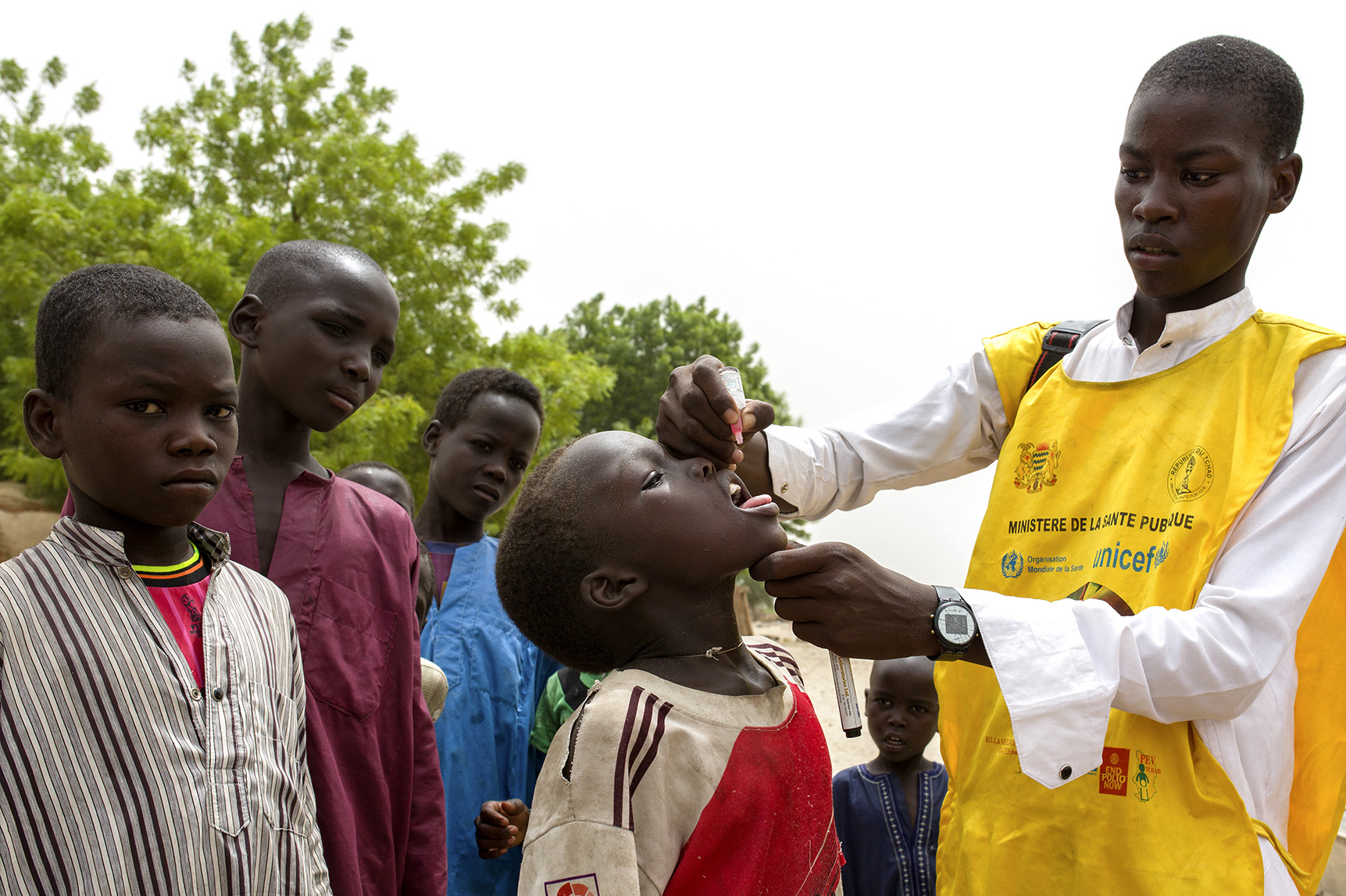
A boy receives a polio vaccination during market day during a series of polio outreach activities on the island of Ngorerom on Lake Chad, by the Lake Chad Polio Task Team aimed at boosting immunity of children against polio following an outbreak in the region in 2016. (Photo: © Christine McNab/UN Foundation)
On behalf of the WHO Africa Region and the ARCC, Moetie attributes this historic achievement to “the leadership and commitment of governments, communities, global polio eradication partners, and philanthropists”.
She also pays special tribute to the frontline health workers and vaccinators, some of whom lost their lives for this noble cause.
“To honour their memory and their legacy, we now need to finish polio once and for all, by accelerating action towards global polio eradication, and stopping the threat of circulating vaccine-derived polioviruses,” says Moeti.
Moeti explains that there has been surveillance of both wild and vaccine-derived polioviruses – an uncommon form of polio that affects populations where there is poor sanitation and low immunisation coverage.
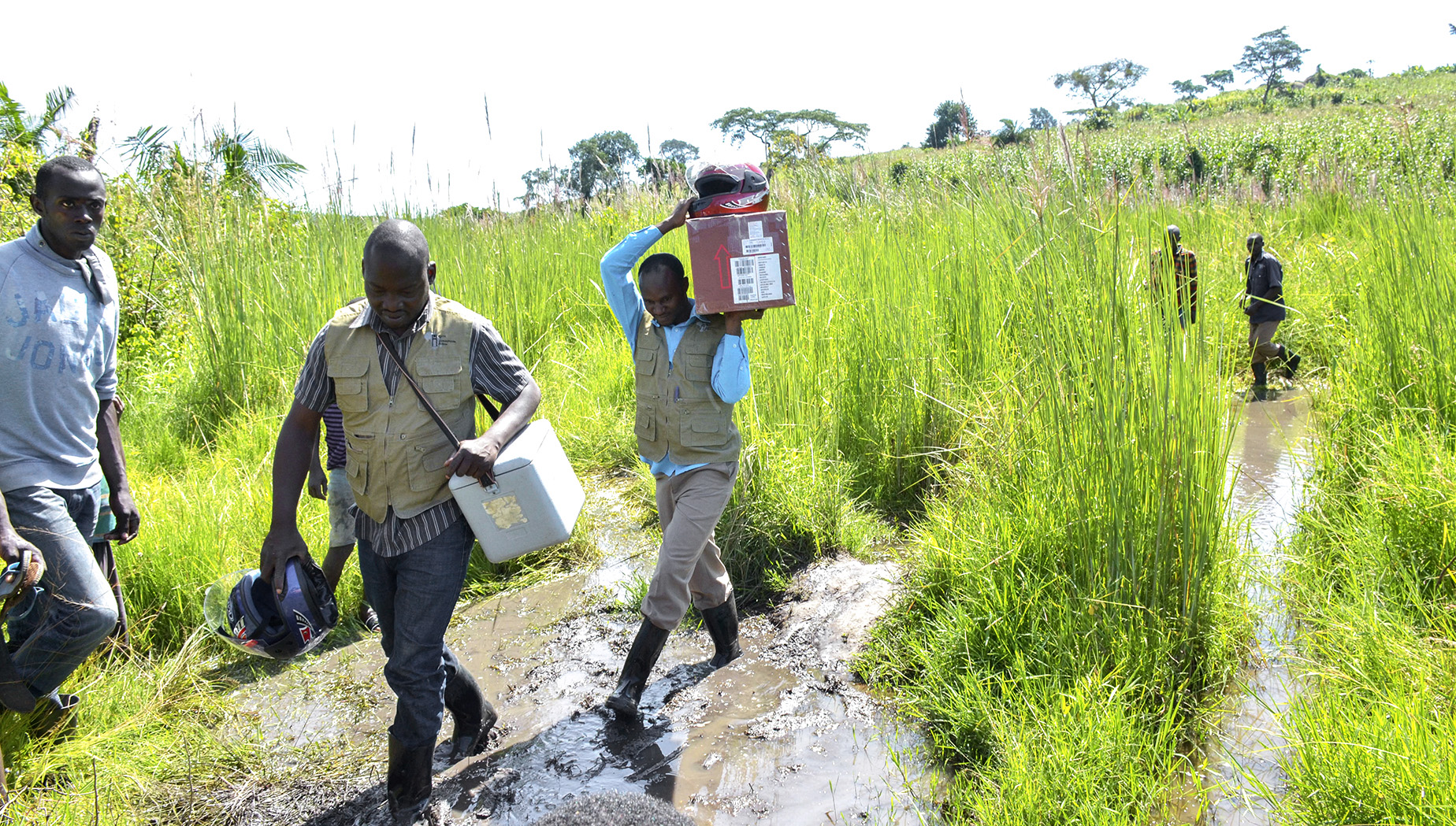
Polio teams from Bujubuli Health Centre on a vaccination outreach wade through swamps to reach children in Kyaka II refugee settlement and those in host communities with polio vaccines, western Uganda, 2018. (Photo: © UNICEF)
Although it is rare, vaccine-derived polioviruses cases can occur when the weakened live virus in the oral polio vaccine passes among under-immunised populations and, over time, changes to a form that can cause paralysis. If a population is adequately immunised with polio vaccines, it will be protected from both wild polio and circulating vaccine-derived polioviruses.
The Covid-19 pandemic disrupted the response to some of these vaccine-derived outbreaks, with the suspension of vaccination campaigns.
As we improve our understanding and build capacities in the response to Covid-19, it is time to look at restarting these campaigns, and ensuring that appropriate precautions are put in place for healthcare workers and communities.
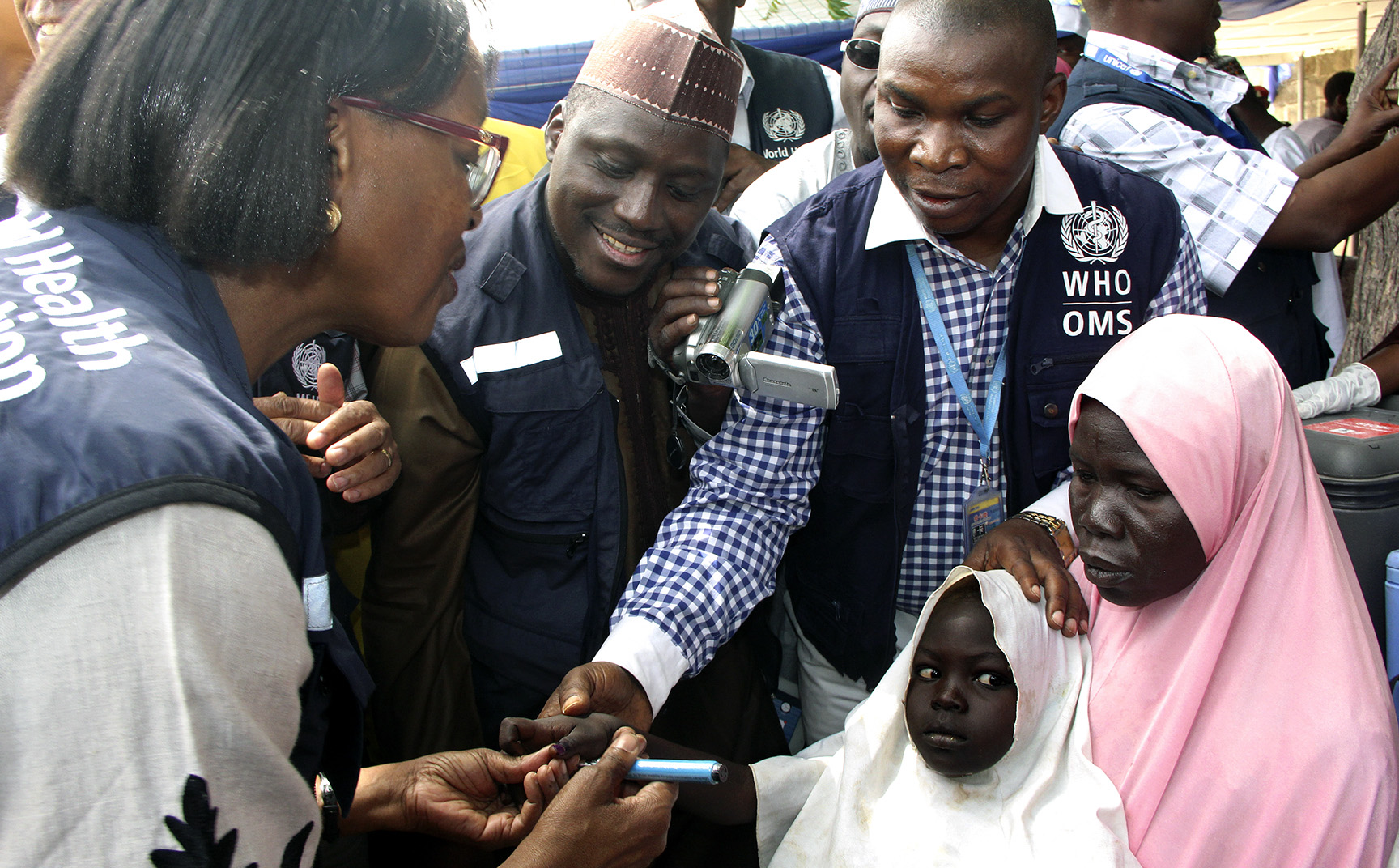
Dr Matshidiso Moeti (L), (WHO) World Health Organization Regional Director for Africa marks a child’s finger during a polio vaccination campaign in Nigeria, 2019. (Photo: © WHO)
Given the Covid-19 pandemic, Moeti says that this achievement serves as a “timely reminder of the incredible things we can achieve by mobilising a massive community of dedicated people to work towards a shared goal”.
When asked about what lessons we can learn from this experience and how they could be applied to the Covid-19 response, Moeti says the expertise gained from polio eradication will continue to assist the African region in tackling Covid-19 and other health problems that have plagued the continent for so many years, and ultimately move the continent toward universal health coverage.
“This will be the true legacy of polio eradication in Africa.”
She adds that “the skills, experience, and technologies used in eradicating polio are a tremendous asset to global health. Already they are being leveraged to support the Covid-19 response, to strengthen routine immunisation and to build health system resilience in Africa.”
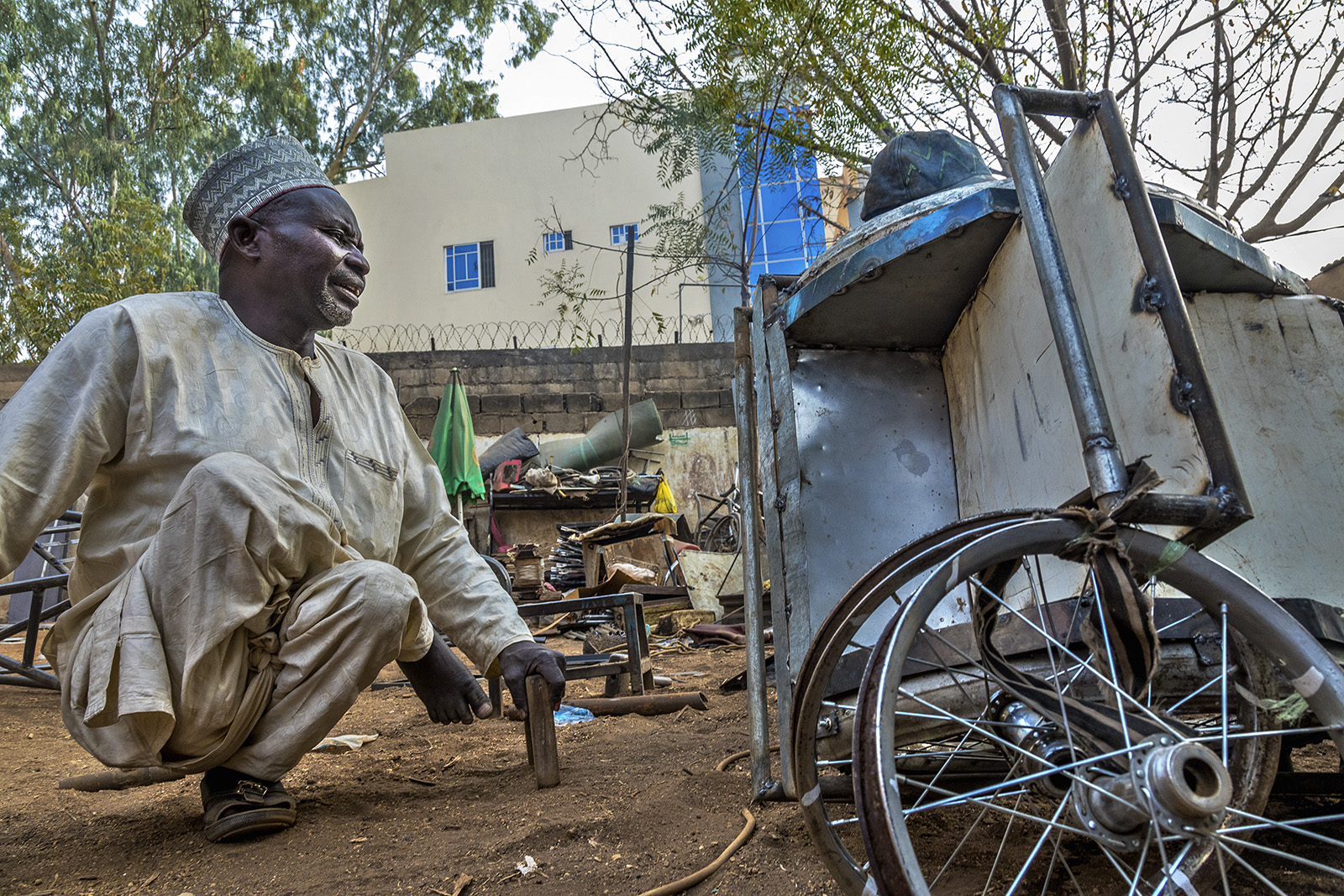
Polio survivor Aminu Ahmed Tudun-Wada, Chairman of the Polio Victims Trust Association who runs a metal workshop where polio survivors fabricate metal products including wheelchairs in Kano State, Nigeria, 2020. (Photo:© Andrew Esiebo/WHO)
Dr Pascal Mkanda, polio eradication programme coordinator, says this achievement brings us one step closer to ridding the world of the poliovirus. Only Afghanistan and Pakistan are still reporting cases.
Although Mkanda and Moeti warn that we must remain vigilant and continue surveillance; it is time for Africa to celebrate this remarkable achievement.
“Now, future generations of African children can live free of the wild poliovirus.”
Moeti says that if they sustain their surveillance and consolidate their data, we will see future eradication in other countries.
The Global Polio Eradication Initiative started in 1988, with the aim of eradicating polio worldwide by the year 2000. While it took significantly longer to eradicate the virus in Africa, Moeti says that it “encourages us to realise that we have a lot to learn about how to strategise and to have impact across a range of circumstances.”.
“What this has taught me is that we need to look immediately at those in the most difficult circumstances, the most disadvantaged people, the most vulnerable people, the hardest to reach people, because that is where we end up with the struggles,” says Moeti.
Moeti says there is a parallel to be drawn with Covid-19:
“If we look at the recent pandemic, those people who have the hardest life circumstances, for one reason or another, are the worst affected in terms of the mortality due to Covid-19.
“This is a lesson we are learning repeatedly.”
Explore the Africa Kicks Out Wild Polio microsite – live at 17:30 today – to learn about the African region’s momentous journey to eradicating the wild poliovirus. DM/MC
Thanks to the dedication of the Global Polio Eradication Initiative, polio cases have reduced by 99.9% since 1988, bringing the world closer than ever before to ending polio. The initiative is a public-private global partnership comprising national governments; WHO; Rotary International; the United States Centres for Disease Control and Prevention; UNICEF; the Bill & Melinda Gates Foundation; Gavi, the Vaccine Alliance; and a broad range of long-term supporters.
"Information pertaining to Covid-19, vaccines, how to control the spread of the virus and potential treatments is ever-changing. Under the South African Disaster Management Act Regulation 11(5)(c) it is prohibited to publish information through any medium with the intention to deceive people on government measures to address COVID-19. We are therefore disabling the comment section on this article in order to protect both the commenting member and ourselves from potential liability. Should you have additional information that you think we should know, please email [email protected]"


















 Become an Insider
Become an Insider